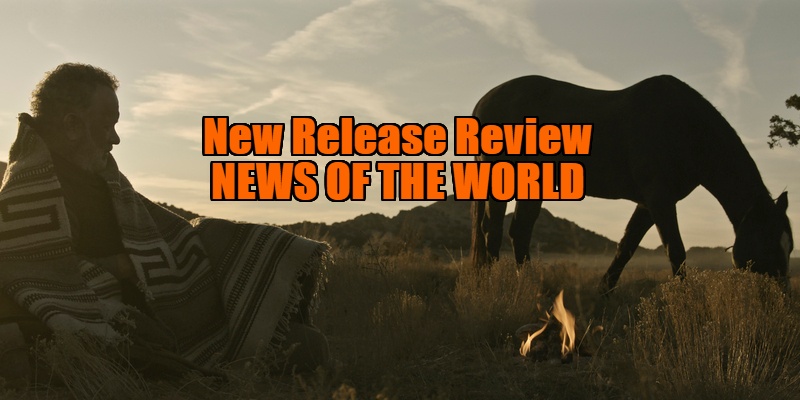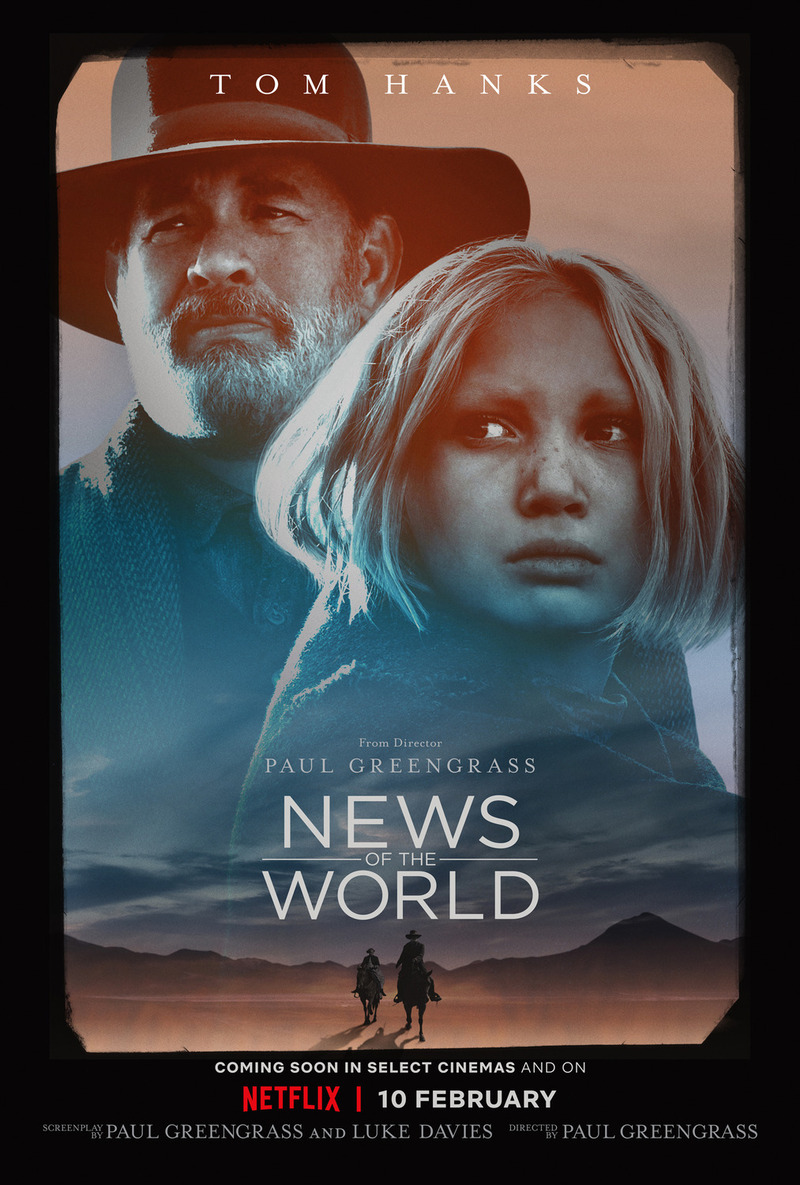
Review by
Eric Hillis
Directed by: Paul Greengrass
Starring: Tom Hanks, Helena Zengel, Neil Sandlands, Mare
Winningham, Ray McKinnon, Bill Camp

German child star Helena Zengel made us all sit up and take notice
last year with her breakout role in Nora Fingscheidt's affecting drama
System Crasher. In that movie she played a feral wild child taken under the wing of a
benevolent man who believes he can civilise her. It didn't take long for
Hollywood to notice Zengel's talents, as she's already made her American
debut in Paul Greengrass's western News of the World, in which she plays...a feral wild child taken under the wing of a
benevolent man who believes he can civilise her.

It's 1870 Texas, and the potential saviour in question is Jefferson Kidd
(Tom Hanks at his Hanksiest), a former Confederate Captain who now
makes a living travelling from town to town reading from a selection of
local, national and international newspapers to attentive crowds of
illiterates. While on his travels, Kidd stumbles across Johanna (Zengel),
a young German girl decked out in the garb of the Kiowa tribe, who
abducted her after slaughtering her family six years prior. When nobody in
the vicinity is willing to look after the child, Kidd takes it upon
himself to escort her on the 400 mile journey to deliver her to a
surviving aunt and uncle.
Along the way, the pair get into various scrapes, battling off would-be
rapists, upsetting land barons and avoiding the Native tribes heard in the
distance. Despite their language barrier, the two form a largely adorable
bond, leading to a predictable conclusion.

News of the World resembles a gritty, revisionist 1970s
western that has had its edges sandpapered to make it more palatable for a
modern White liberal audience. Kidd is exactly the sort of unimpeachable
do-gooder Hanks is so often attracted to, and there are two major issues
with his character. One is that he feels like a product of our modern
progressiveness that has anachronistically been planted in 1870s America,
always saying exactly the right thing to win our moral approval. But the
major problem with Kidd is that he has no dramatic arc of note. He begins
the movie as a morally upright man, and - to borrow from an analogy
employed in the movie - simply carries on in a straight line. As such,
there's never any real conflict between himself and Johanna, who warms to
him far too quickly. A more interesting version of this movie might have
had Kidd accept the mission to return Johanna to her family for purely
monetary reasons, only for him to develop an affection for the child as
the story progresses. You could imagine a grouchy '70s Clint Eastwood and
a ruddy faced Tatum O'Neal pulling off this dynamic in a Don Siegel
movie.
Greengrass's film is so smugly content with its liberal ideals that it's
blind to how problematic it really is. No Black characters get a speaking
part, but a lynched corpse is cheaply used as a prop to illustrate how
Kidd is disgusted by racism. The film likely thinks it's being even-handed
in its treatment of the Kiowa, with Kidd remarking how Johanna has lost
two sets of parents. Why then does the movie take a detour to the site of
the massacre of her German family, with the bloody aftermath of the
slaughter painted on walls and ocre-encrusted mattresses, but refuses to
similarly reflect on the killing of her Kiowa kin at the hands of the
Cavalry? There's also a stench of elitism about Kidd, who sanctimoniously
lectures yokels about the importance of reading and storytelling, when
they're too busy breaking their backs building railroads and tending to
crops for such niceties.

If you can look past the film's hypocritical politics, there's an
engaging enough Sunday afternoon western romp to be enjoyed here.
Greengrass has thankfully invested in a tripod, eschewing the migraine
inducing shaky cam style he's known for, and while the film is rather
blandly shot, at least it's not distracting, as Greengrass wisely keeps
focus on his charismatic leads.
The most interesting aspect of News of the World is how
Kidd delivers the news, facing the question of which stories he should
tell depending on the audience. It's a shame the movie doesn't delve
deeper into this notion, as it's a topic ripe for exploring in our era of
heavily editorialised news coverage.


